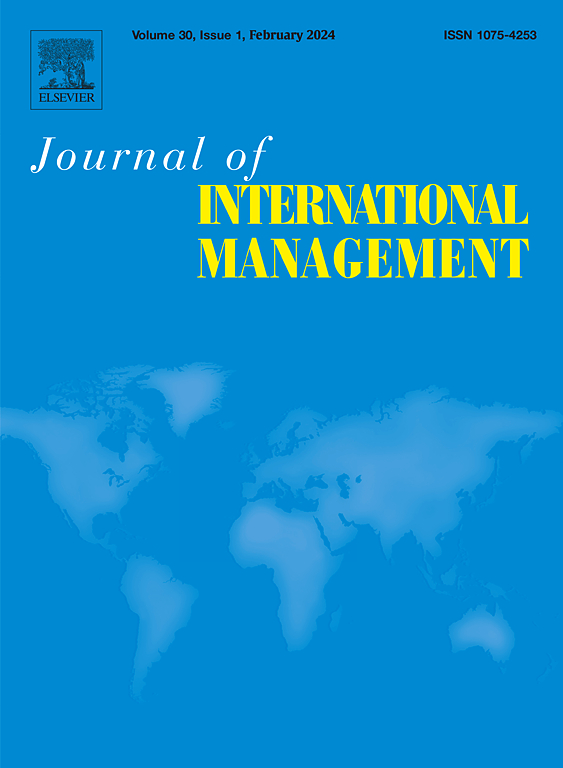Self-serving leadership and knowledge hiding in MNEs: Examining the roles of emotional exhaustion and thriving at work
IF 5.9
2区 管理学
Q1 MANAGEMENT
引用次数: 0
Abstract
Knowledge is an important resource for the development of individuals and the successful operation of companies, yet knowledge hiding (KH) within organizations is universal. Based on the conservation of resources theory, this study investigates the relationship between self-serving leadership (SSL) and individual KH through a moderated mediation model of emotional exhaustion (EE) and thriving at work (TAW). Two-wave survey data is collected from employees working in MNEs operating in China. The results show that SSL positively affects individual KH, and that EE plays a mediating role in this process. TAW negatively moderates the effect of EE on KH, and further moderates the indirect effect of SSL on employees' KH behavior through EE. Implications for theory, practice and future research are also discussed. The novel process that links SSL and individual KH behavior enriches the leadership-KH literature. Linking EE and TAW to the leadership-KH relationship further extends the mechanisms and boundary conditions that may influence KH. The main practical suggestions are to optimize the human resource management strategy and establish a positive corporate atmosphere.
跨国公司的自私自利领导与知识隐藏:检视情绪耗竭与职场繁荣的作用
知识是个人发展和企业成功运营的重要资源,而组织内部的知识隐藏现象是普遍存在的。本研究基于资源守恒理论,通过情绪耗竭(EE)和工作繁荣(TAW)的调节中介模型,探讨了自我服务型领导(SSL)与个体KH之间的关系。两波调查数据来自在中国运营的跨国公司的员工。结果表明,SSL正向影响个体KH, EE在此过程中起中介作用。TAW负向调节情感表达对员工KH行为的影响,并通过情感表达进一步调节SSL对员工KH行为的间接影响。对理论、实践和未来研究的启示进行了讨论。将SSL与个体KH行为联系起来的新过程丰富了领导力-KH文献。将EE和TAW与领导-KH关系联系起来,进一步扩展了可能影响KH的机制和边界条件。主要的实践建议是优化人力资源管理战略,营造积极向上的企业氛围。
本文章由计算机程序翻译,如有差异,请以英文原文为准。
求助全文
约1分钟内获得全文
求助全文
来源期刊

Journal of International Management
MANAGEMENT-
自引率
9.80%
发文量
67
审稿时长
81 days
期刊介绍:
The Journal of International Management is devoted to advancing an understanding of issues in the management of global enterprises, global management theory, and practice; and providing theoretical and managerial implications useful for the further development of research. It is designed to serve an audience of academic researchers and educators, as well as business professionals, by publishing both theoretical and empirical research relating to international management and strategy issues. JIM publishes theoretical and empirical research addressing international business strategy, comparative and cross-cultural management, risk management, organizational behavior, and human resource management, among others.
 求助内容:
求助内容: 应助结果提醒方式:
应助结果提醒方式:


